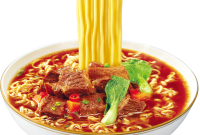spicy food affect the body:
Spicy foods contain substances that give them their distinctive heat or spiciness, such as capsaicin, which is largely found in chili peppers. When you eat spicy food, the chemical capsaicin interacts with your body in a number of ways, impacting multiple systems and evoking a range of emotions.
Here are some effects of spicy food on the body:
Sensation and taste: The transient receptor potential vanilloid 1 (TRPV1) receptors, specifically, are activated by capsaicin in your mouth and on your tongue. Your brain receives messages from these receptors when it senses heat, which gives you a feeling of spiciness.
Endorphin Release: Eating spicy food might cause the body’s natural painkillers, endorphins, to be released. Endorphins can cause a pleasant feeling or “spice high,” which may be why some individuals appreciate the taste of spicy food.
Heart rate and breathing can both increase as a result of capsaicin’s ability to trigger the production of adrenaline. Temporarily feeling more awake and aware can result from this.
Spicy food can cause you to sweat, which is the body’s way of cooling off, and has a cooling effect. Even though the real body temperature doesn’t change, capsaicin has the ability to activate the same receptors that react to heat, giving the sensation of a higher temperature.
Digestive System: People with sensitive digestive systems may experience discomfort or irritability due to spicy foods’ ability to trigger the formation of stomach acid. Heartburn, acid reflux, or stomach discomfort may result from this.
Weight Loss and Metabolism: According to some research, capsaicin may momentarily increase metabolism, which may help people control their weight. It might boost thermogenesis, increasing calorie burning.
Pain relief: Topical creams containing capsaicin are used to relieve pain, particularly in cases of arthritis and muscle soreness. Substance P, a neurotransmitter that delivers pain signals, is lessened as a result of its action.
Potential Health Benefits: According to some research, the chemicals in spicy foods, such as capsaicin, may have antioxidant, anti-inflammatory, and maybe anti-cancer qualities. To completely comprehend these possible health advantages, more study is necessary.
While many people enjoy spicy food, it’s important to remember that overindulging in it or eating it if you have certain medical conditions, such gastrointestinal problems, could cause discomfort or other health problems. Always pay attention to your body’s signals and limit your intake of spicy foods according to your tastes and tolerance.
It’s crucial to remember that everyone reacts to spicy food differently depending on their tolerance, health, and diet as a whole. It’s important to use moderation while eating spicy foods and to be aware of how your body reacts to them in order to maximize benefits and minimize risks. Before making large dietary changes if you have certain health issues, it is essential to speak with a healthcare provider.

Advantages and Disadvantages
Depending on personal tastes, health conditions, and consumption levels, spicy cuisine, which frequently contains components like chili peppers and spices, can have both benefits and drawbacks.
Here are some typical benefits and drawbacks of eating spicy food:
Spicy food can offer a distinctive and interesting flavor to foods, enhancing the overall taste and increasing the enjoyment of meals.
Appetite and Satiety: Spicy meals can occasionally encourage a sensation of fullness and cause people to eat less overall, which may help with weight control.
Increased Metabolism: Capsaicin, a compound found in chili peppers, may momentarily raise metabolism and improve fat-burning, possibly assisting with weight loss attempts.
Spices with anti-inflammatory and antioxidant qualities, like turmeric and ginger, which are frequently present in hot dishes, may have health benefits.
Pain relief: Capsaicin can be applied topically to relieve pain, especially in cases of arthritis or aching muscles.
Enhancement of Mood: Consuming spicy meals can cause the production of endorphins, which elevates mood and fosters feelings of enjoyment.
Disadvantages:
Digestive Discomfort: For people with sensitive digestive systems, spicy foods can irritate the digestive tract, resulting in discomfort, heartburn, acid reflux, or gastrointestinal problems.
Gastrointestinal Disorders: Consuming spicy foods might make symptoms of illnesses like Crohn’s disease, ulcerative colitis, or irritable bowel syndrome (IBS) worse.
Consuming spicy foods close to bedtime may result in indigestion or pain, which could prevent you from falling asleep.
Increased Thirst: Spicy foods can increase your thirst because of the heat, which causes you to drink more fluids.
Skin Irritation: Some people may experience skin irritation or allergic responses after coming into direct touch with spicy foods, especially those made from specific peppers.
Spicy foods can exacerbate the symptoms of gastroesophageal reflux disease (GERD), leading to more frequent acid reflux and discomfort.
It’s crucial to remember that everyone reacts to spicy food differently depending on their tolerance, health, and diet as a whole. It’s important to use moderation while eating spicy foods and to be aware of how your body reacts to them in order to maximize benefits and minimize risks. Before making large dietary changes if you have certain health issues, it is essential to speak with a healthcare provider.
While many people enjoy spicy food, it’s important to remember that overindulging in it or eating it if you have certain medical conditions, such gastrointestinal problems, could cause discomfort or other health problems. Always pay attention to your body’s signals and limit your intake of spicy foods according to your tastes and tolerance.




